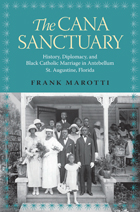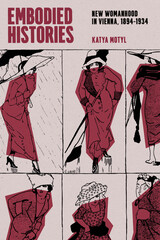2 books by Marotti, Frank

The Cana Sanctuary
History, Diplomacy, and Black Catholic Marriage in Antebellum St. Augustine, Florida
Frank Marotti
University of Alabama Press, 2012
Uses the collective testimony from more than two hundred Patriot War claims, previously believed to have been destroyed, to offer insight into the lesser-known Patriot War of 1812 and to constitute an intellectual history of everyday people caught in the path of an expanding American empire
In the late seventeenth century a group of about a dozen escaped African slaves from the English colony of Carolina reached the Spanish settlement of St. Augustine. In a diplomatic bid for sanctuary, to avoid extradition and punishment, they requested the sacrament of Catholic baptism from the Spanish Catholic Church. Their negotiations brought about their baptism and with it their liberation. The Cana Sanctuary focuses on what author Frank Marotti terms “folk diplomacy”—political actions conducted by marginalized, non-state sectors of society—in this instance by formerly enslaved African Americans in antebellum East Florida. The book explores the unexpected transformations that occurred in seventeenth- and eighteenth-century St. Augustine as more and more ex-slaves arrived to find their previously disregarded civil rights upheld under sacred codes by an international, nongovernmental, authoritative organization.
With the Catholic Church acting as an equalizing, empowering force for escaped African slaves, the Spanish religious sanctuary policy became part of popular historical consciousness in East Florida. As such, it allowed for continual confrontations between the law of the Church and the law of the South. Tensions like these survived, ultimately lending themselves to an “Afro-Catholicism” sentiment that offered support for antislavery arguments.
In the late seventeenth century a group of about a dozen escaped African slaves from the English colony of Carolina reached the Spanish settlement of St. Augustine. In a diplomatic bid for sanctuary, to avoid extradition and punishment, they requested the sacrament of Catholic baptism from the Spanish Catholic Church. Their negotiations brought about their baptism and with it their liberation. The Cana Sanctuary focuses on what author Frank Marotti terms “folk diplomacy”—political actions conducted by marginalized, non-state sectors of society—in this instance by formerly enslaved African Americans in antebellum East Florida. The book explores the unexpected transformations that occurred in seventeenth- and eighteenth-century St. Augustine as more and more ex-slaves arrived to find their previously disregarded civil rights upheld under sacred codes by an international, nongovernmental, authoritative organization.
With the Catholic Church acting as an equalizing, empowering force for escaped African slaves, the Spanish religious sanctuary policy became part of popular historical consciousness in East Florida. As such, it allowed for continual confrontations between the law of the Church and the law of the South. Tensions like these survived, ultimately lending themselves to an “Afro-Catholicism” sentiment that offered support for antislavery arguments.
[more]

Heaven's Soldiers
Free People of Color and the Spanish Legacy in Antebellum Florida
Frank Marotti
University of Alabama Press, 2013
Heaven’s Soldiers chronicles the history of a community of free people of African descent who lived and thrived, while resisting the constraints of legal bondage, in East Florida in the four decades leading up to the Civil War.
Historians have long attributed the relatively flexible system of race relations in pre–Civil War East Florida to the area’s Spanish heritage. While acknowledging the importance of that heritage, this book gives more than the usual emphasis to the role of African American agency in exploiting the limited opportunities that such a heritage permitted.
Spanish rule presented institutions and customs that talented, ambitious, and fortunate individuals might, and did, exploit. Although racial prejudice was never absent, persons of color aspired to lives of dignity, security, and prosperity. Frank Marotti’s subjects are the free people of African descent in the broad sense of the term “free,” that is, not just those who were legally free, but all those who resisted the constraints of legal bondage and otherwise asserted varying degrees of control over themselves and their circumstances. Collectively, this population was indispensable to the evolution of the existing social order.
In Heaven’s Soldiers, Marotti studies four pillars of black liberty that emerged during Spain’s rule and continued through the United States’ acquisition of Florida in 1821: family ties to the white community, manumission, military service, and land ownership. The slaveowning culture of the United States eroded a number of these pillars, though black freedom and agency abided in ways unparalleled anywhere else in the pre–Civil War United States. Indeed, a strong black martial tradition arguably helped to topple Florida’s slave-holding regime, leading up to the start of the Civil War.
Marotti surveys black opportunities and liabilities under the Spaniards; successful defenses of black rights in the 1820s as well as chilling statutory assaults on those rights; the black community’s complex involvement in the Patriot War and the Second Seminole War; black migration in the two decades leading up to the US Civil War; and African American efforts to preserve marriage and emancipation customs, and black land ownership.
[more]
READERS
Browse our collection.
PUBLISHERS
See BiblioVault's publisher services.
STUDENT SERVICES
Files for college accessibility offices.
UChicago Accessibility Resources
home | accessibility | search | about | contact us
BiblioVault ® 2001 - 2024
The University of Chicago Press









